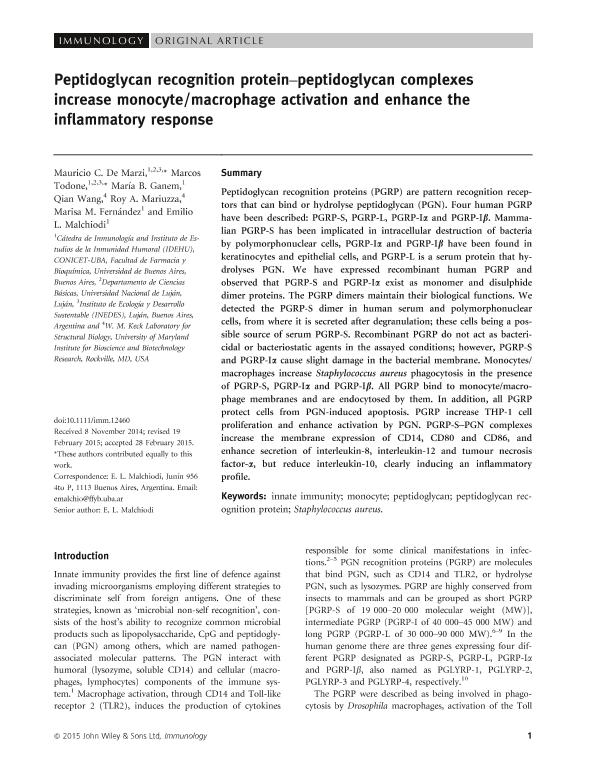Artículo
Peptidoglycan recognition protein–peptidoglycan complexes increase monocyte/macrophage activation and enhance the inflammatory response
de Marzi, Mauricio Cesar ; Todone, Marcos
; Todone, Marcos ; Ganem, María Bernarda
; Ganem, María Bernarda ; Wang, Qian; Mariuzza, Roy A.; Fernández, Marisa Mariel
; Wang, Qian; Mariuzza, Roy A.; Fernández, Marisa Mariel ; Malchiodi, Emilio Luis
; Malchiodi, Emilio Luis
 ; Todone, Marcos
; Todone, Marcos ; Ganem, María Bernarda
; Ganem, María Bernarda ; Wang, Qian; Mariuzza, Roy A.; Fernández, Marisa Mariel
; Wang, Qian; Mariuzza, Roy A.; Fernández, Marisa Mariel ; Malchiodi, Emilio Luis
; Malchiodi, Emilio Luis
Fecha de publicación:
03/2015
Editorial:
Wiley
Revista:
Immunology
ISSN:
0019-2805
Idioma:
Inglés
Tipo de recurso:
Artículo publicado
Clasificación temática:
Resumen
Peptidoglycan recognition proteins (PGRPs) are pattern recognition receptors (PRRs) that can bind or hydrolyze peptidoglycan (PGN). Humans have 4 PGRPs denominated PGRP-S, PGRP-L, PGRP-Iα and PGRP-Iβ. Mammalian PGRP-S has been implicated in intracellular destruction of bacteria by polymorphonuclear cells (PMN), PRGP-Iα and PGRP-Iβ have been found in keratinocytes and epithelial cells while PGRP-L is a serum protein that hydrolyzes PGNs. We expressed here recombinant human PGRPs and observed that PGRP-S and PGRP-Iα exist as monomer and disulfide dimer proteins. PGRPs dimers maintain their biological functions. We detected PGRP-S dimer in human serum and PMN, from where it is secreted after degranulation, being these cells a possible source of serum PGRP-S. Recombinant PGRPs do not act as bactericidal or bacteriostatic agents in the assayed conditions, however PGRP-S and PGRP-Iα cause slight damage in the bacterial membrane. Monocytes/macrophages increase S. aureus phagocytosis in the presence of PGRP-S, PGRP-Iα and PGRP-Iβ. All PGRPs bind to monocyte/macrophage membrane and are endocyted by them. In addition, all PGRPs protect cells from PGN-induced apoptosis. PGRPs increase THP-1 cell proliferation and enhance activation by PGN. PGRP-S-PGN complexes increase the membrane expression of CD14, CD80 and CD86, and enhance secretion of IL-8, IL-12and TNF-α, but reduce IL-10, clearly inducing an inflammatory profile
Palabras clave:
Pgrp
,
Peptidoglican
Archivos asociados
Licencia
Identificadores
Colecciones
Articulos(IDEHU)
Articulos de INST.DE EST.DE LA INMUNIDAD HUMORAL PROF.R.A.MARGNI
Articulos de INST.DE EST.DE LA INMUNIDAD HUMORAL PROF.R.A.MARGNI
Citación
de Marzi, Mauricio Cesar; Todone, Marcos; Ganem, María Bernarda; Wang, Qian; Mariuzza, Roy A.; et al.; Peptidoglycan recognition protein–peptidoglycan complexes increase monocyte/macrophage activation and enhance the inflammatory response; Wiley; Immunology; 145; 3; 3-2015; 429-442
Compartir
Altmétricas



